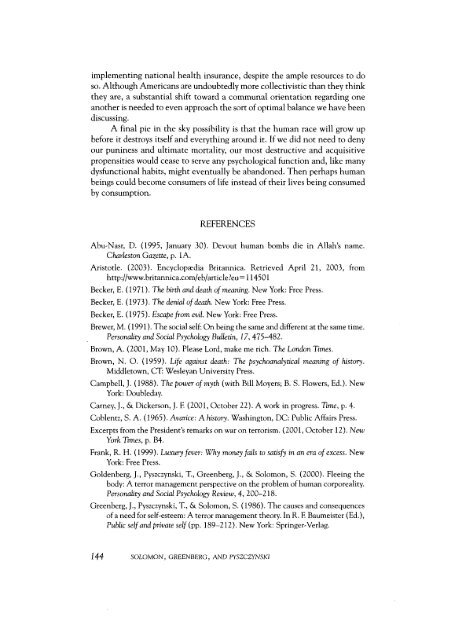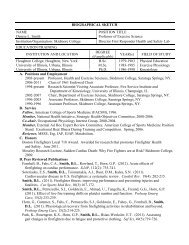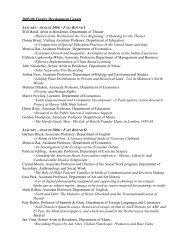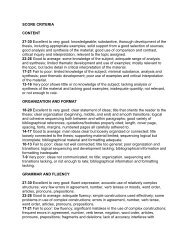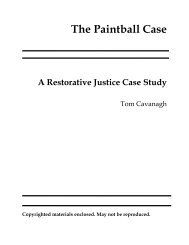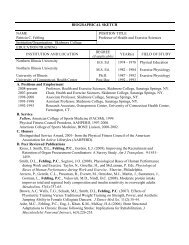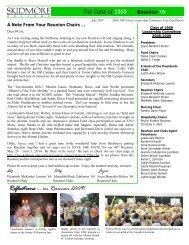Lethal consumption: Death-denying materialism
Lethal consumption: Death-denying materialism
Lethal consumption: Death-denying materialism
Create successful ePaper yourself
Turn your PDF publications into a flip-book with our unique Google optimized e-Paper software.
implementing national health insurance, despite the ample resources to do<br />
so. Although Americans are undoubtedly more collectivistic than they think<br />
they are, a substantial shift toward a communal orientation regarding one<br />
another is needed to even approach the sort of optimal balance we have been<br />
discussing.<br />
A final pie in the sky possibility is that the human race will grow up<br />
before it destroys itself and everything around it. If we did not need to deny<br />
our puniness and ultimate mortality, our most destructive and acquisitive<br />
propensities would cease to serve any psychological function and, like many<br />
dysfunctional habits, might eventually be abandoned. Then perhaps human<br />
beings could become consumers of life instead of their lives being consumed<br />
by <strong>consumption</strong>.<br />
REFERENCES<br />
Abu-Nasr, D. (1995, January 30). Devout human bombs die in Allah's name.<br />
Charleston Gazette, p. 1A.<br />
Aristotle. (2003). Encyclopaedia Britannica. Retrieved April 21, 2003, from<br />
http://www.britannica.com/eb/article ?eu=114501<br />
Becker, E. (1971). The birth and death of meaning. New York: Free Press.<br />
Becker, E. (1973). The denial of death. New York: Free Press.<br />
Becker, E. (1975). Escape from evil. New York: Free Press.<br />
Brewer, M. (1991). The social self: On being the same and different at the same time.<br />
Personality and Social Psychology Bulletin, 17, 475-482.<br />
Brown, A. (2001, May 10). Please Lord, make me rich. The London Times.<br />
Brown, N. O. (1959). Life against death: The psychoanalytical meaning of history.<br />
Middle.town, CT: Wesleyan University Press.<br />
Campbell, J. (1988). The power of myth (with Bill Moyers; B. S. Flowers, Ed.). New<br />
York: Doubleday.<br />
Carney, J., &. Dickerson, J. F. (2001, October 22). A work in progress. Time, p. 4.<br />
Coblentz, S. A. (1965). Avarice: A history. Washington, DC: Public Affairs Press.<br />
Excerpts from the President's remarks on war on terrorism. (2001, October 12). New<br />
York Times, p. B4-<br />
Frank, R. H. (1999). Luxury fever: Why money fails to satisfy in an era of excess. New<br />
York: Free Press.<br />
Goldenberg, J., Pyszczynski, T, Greenberg, J., & Solomon, S. (2000). Fleeing the<br />
body: A terror management perspective on the problem of human corporeality.<br />
Personality and SociaJ Psychology Review, 4, 200-218.<br />
Greenberg, J., Pyszczynski, T, & Solomon, S. (1986). The causes and consequences<br />
of a need for self-esteem: A terror management theory. In R. F. Baumeister (Ed.),<br />
Public self and private self (pp. 189-212). New York: Springer-Verlag.<br />
144 SOLOMON, GREENBERG, AND PYSZCZYNSKI


